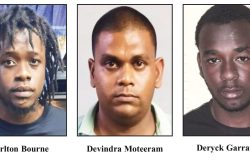While recently boasting of strides made by the judiciary, particularly in eliminating the case-backlog, acting Chancellor of the Judiciary, Yonette Cummings-Edwards also lamented the shortage of judges which continues to plague it.
The Chancellor was at the time addressing a gathering two weeks ago at the launch of the Electronic Notice Boards at the Georgetown Magistrate’s Court.
It was there that she made an appeal for adequate staffing of the judiciary, stating that the 13 judges altogether currently presiding in the three High Courts across each of the three counties, were inadequate.
Against this background, she made a direct appeal to Attorney General (AG) and Minister of Legal Affairs, Anil Nandlall SC, who was in attendance, even as she expressed optimism; “I know he is taking heed of our cries.”
The Judicial Service Commission (JSC)—a key body in the appointment of judges— is still to be reconstituted.
Fast approaching two years since the PPP/C took office, and following repeated assurances of its Government’s commitment in ensuring the reappointment of the JSC, it continues to be in abeyance. The JSC has not been reconstituted since 2017.
President Irfaan Ali had committed in November of last year to his constitutional mandate in ensuring the necessary appointments to the Commission as well as the long overdue substantive appointments of the two top judicial posts of Chancellor of the Judiciary and Chief Justice, but there has been no progress.
Those critical constitutional appointments which require consultation with the Leader of the Opposition, however, have hit a snag, as the post is vacant. The opposition APNU+AFC is yet to have its new leader—Aubrey Norton—registered as a Member of the National Assembly, following the resignation of the previous Opposition Leader Joseph Harmon. Norton is expected to become the new Leader of the Opposition.
Owing to a number of administrative setbacks, Norton’s admission to the National Assembly is yet to be done, which seems likely only in April since the resignation of APNU+AFC MP Nicolette Henry will take effect on March 31st. It is only after then that Norton can be elected Opposition Leader.
Since Henry’s resignation, former Opposition Leader Harmon has signalled his intention to resign from the National Assembly. On Thursday he sent a letter to Speaker of the National Assembly Manzoor Nadir indicating his intention to resign effective March 14, 2022. If this resignation goes ahead, Norton could have an earlier entrance to Parliament.
Zero
At the forum last month, Chancellor Cummings-Edwards said that with the advent of the new Civil Procedure Rules (2016), “the Supreme Court can boast of a zero backlog of all matters under the old rules.”
She said that cases filed under the old Civil Procedure Rules (CPR) of the High Court from 1955, took over three years before hearing dates were assigned, while noting in contrast that the pace afforded under the new rules, specifically allows for more efficient case-management.
She noted that under the new rules, a hearing date can be assigned within a few months of filing, and cases pass through the court with more efficient case-management systems; while adding that the pretrial process itself is much shorter, as the overriding objective is to deal with cases justly.
“The pace at which cases are being filed and managed today under the new rules have us all crying out for more judges,” Justice Cummings-Edwards said; even as she sounded the need for more magistrates as well.
“The Attorney General is present and I know he is taking heed of our cries. We have need for more than the 11 + 2 judges that currently obtains in the Supreme Court…We also need more Magistrates,” she said.
The Chancellor shared that only recently Chief Magistrate Ann McLennan asked “whether we can make them (Magistrates) out of clay.”
The Chancellor noted that while the Chief Magistrate herself knows the answer to that question, it goes more to magnifying the urgency of the situation.
The JSC plays a critical role in the appointment of new magistrates and judges and in its absence, this appointment process is significantly hampered and further compounds the already existing issues posed by a shortage of judges.
Previously, Ali had refused to engage Harmon owing to the latter’s refusal to recognize the government as legitimate.
Though not a constitutional requirement, Ali sought to make Harmon’s refusal to recognize the legitimacy of his government, a prerequisite for consultation, stating that unless Harmon so recognized his government, he would have no meeting with him.
Following criticisms, however, Ali would eventually walk back on the precondition he had set.
Meanwhile, Harmon had expressed his willingness to meet Ali.
Back in August of last year, Nandlall had said that President Ali was in the process of conducting the requisite consultations to have the appointments to the JSC made by the end of that very month.
Commenting on the President’s refusal at that time to meet with Harmon, the AG had said that the two would have to “fashion a way” forward, but that as Attorney General he could only urge constitutional compliance.
The JSC has not been re-appointed since its expiration on September 30th, 2017, which Nandlall acknowledged as being “long overdue.”
In accordance with Article 198 (1) of the Constitution, the members of the Judicial Service Commission shall be—(a) the Chancellor, who shall be Chairman;
(b) the Chief Justice;
(c) the Chairman of the Public Service Commission; and
(d) such other members referred to as…appointed members.
On February 22nd of last year, the Committee of Appointments of Parliament nominated Justice (r’td) Beasraj Singh Roy to sit as a member of the JSC.
In accordance with Article 128 (1) of the Constitution, judges, other than the Chancellor and the Chief Justice, are to be appointed by the President, who shall act in accordance with the advice of the Judicial Service Commission.








